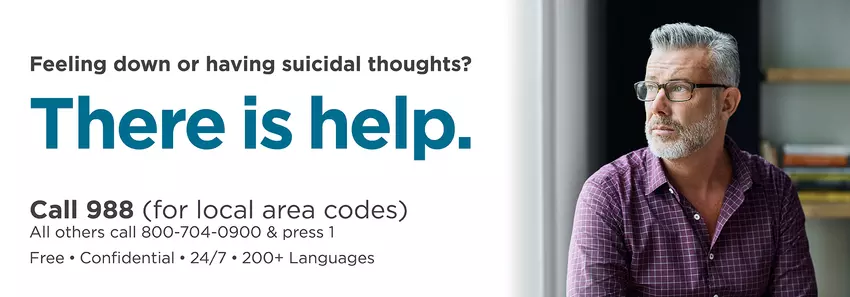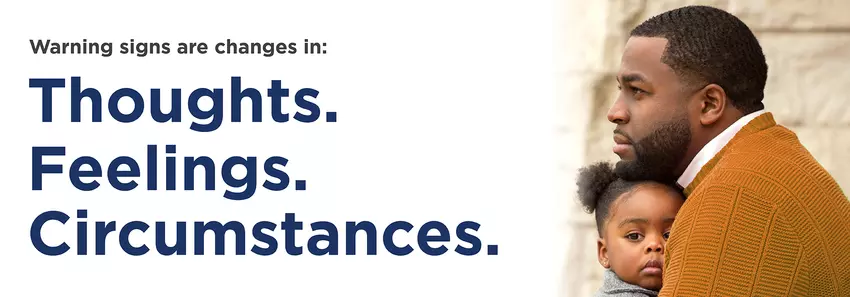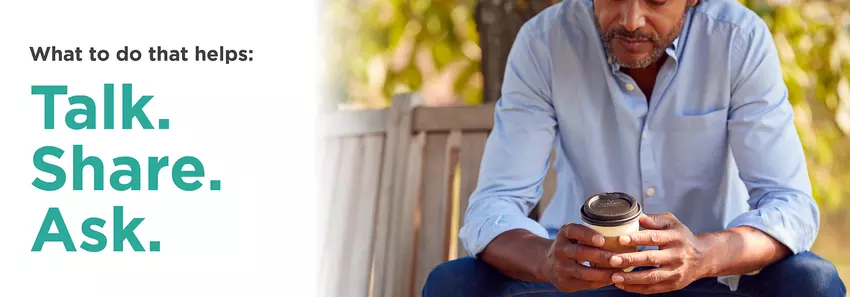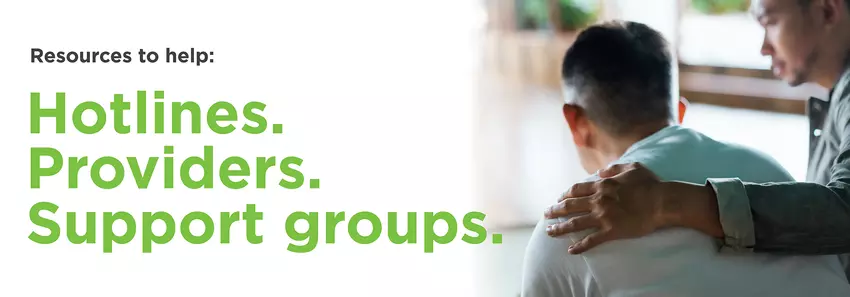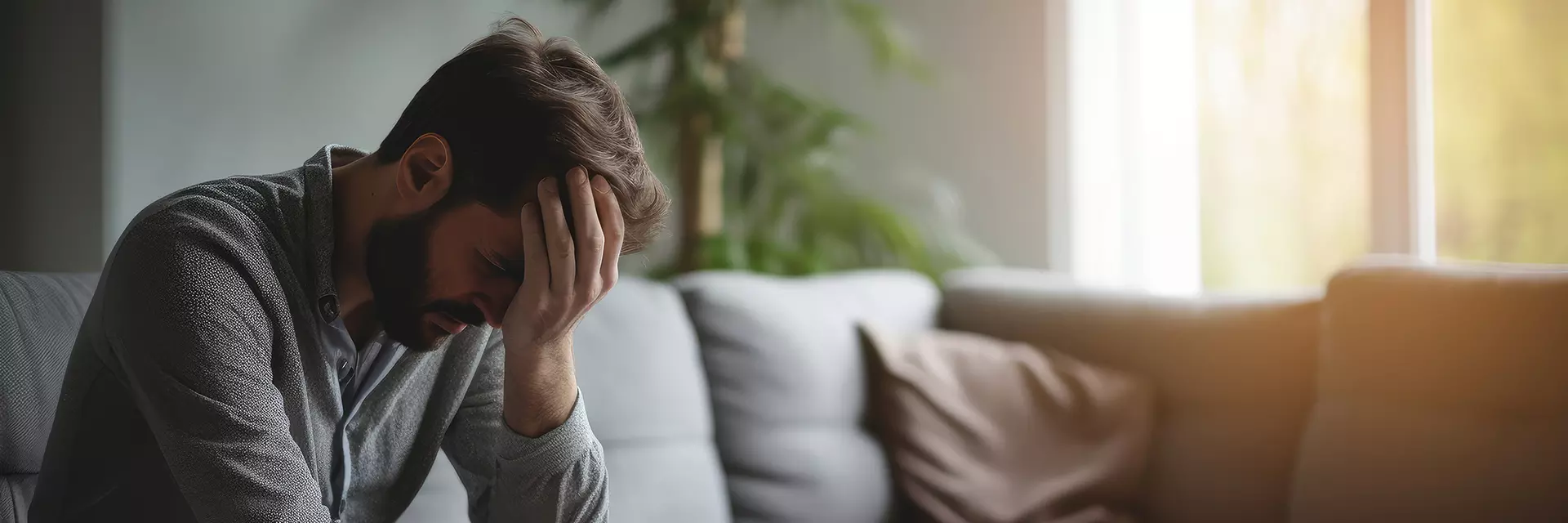
Suicide in men in their 30s, 40s, and 50s
Overview
Being a man isn’t easy—feeling like you always have to be strong can be hard. And these days it can be even harder. In tough times, feeling isolated, depressed, or anxious is common. These feelings can lead to other difficult changes. If these feelings or changes interfere with your life or go on for too long, there could be a bigger problem going on, and it might just be time to do something different: Find help. Men in their 30s, 40s, and 50s can be at higher risk of suicide, especially during times of high stress. Plenty of support is available.
Know the warning signs
Feeling depressed and isolated is not the only sign that something is wrong. There may be other signs that you need help. These include:
- Trouble coping with physical changes, such as sleep, energy level or appetite changes.
- Unbearable chronic pain.
- Thinking life is not worth living.
- Thinking about hurting yourself or having suicidal thoughts.
- Thinking others are better off without you.
- Feeling isolated from others who understand you.
- Feeling inadequate.
- Feeling like a burden to others.
- Feeling abandoned or betrayed.
- Feeling ashamed of who you are.
- Feeling hopeless, desperate, or trapped.
- Having no sense of purpose.
- Having sudden mood changes.
- Giving away prized possessions.
- Doing careless things that put you in danger.
- Putting affairs in order.
- Increasing drug or alcohol use.
- Withdrawing and spending most of your time alone.
- Purchasing a firearm or other weapon.
- Financial stress.
- General anxiety, e.g. about your and your family’s health and wellbeing.
- Chronic or terminal illness.
- Death or suicide of a loved one.
- Conflict with your family or community support system.
- Exposure to trauma, such as abuse or bullying.
- Being treated unfairly because of who you are.
- Not having others who understand you.
- Failure to meet expectations.
- Trouble adjusting to a new culture.
What to do that helps:
Talk to your doctor or any other health care or mental health professional, such as a nurse, therapist or counselor. Do not be afraid to tell them what you are feeling and let them know what has changed. They can help you pinpoint problems and discuss treatment options.
Friends and family members may have noticed a change that you cannot see. Share your feelings and listen to what they have to say. Faith leaders or spiritual advisors can also be a good place to start.
If you belong to a community organization, support group, or participate in any other community-based programs, talk to a fellow member, staff person, or volunteer about support or resources.
Contact one of the mental health and suicide prevention services listed below to speak with an experienced professional. Asking for help is a sign of strength.
When someone is showing warning signs or struggling with thoughts of suicide, even as you seek help, it’s important to keep the immediate surroundings safe. Clear away any potentially lethal items from your household; these include firearms, medications, knives and scissors, and any items that could be used as ligatures (e.g. belts, ropes, shoelaces). You can find more ways to keep someone safe in Suicide by Ligature: A Caregivers Support Guide.
Firearms can be temporarily stored outside of the home. The resources below include different firearm safety options to protect you and your loved ones, or you can consult the 11 Commandments of Gun Safety.
Resources to help:
All are 24/7, free, confidential
Santa Clara County Suicide and Crisis Hotline
Dial 9-8-8
Trained volunteer counselors available 24/7
Crisis Text Line Number
Text RENEW to 741741
Trained volunteer counselors available by text message
English only
Veterans’ Crisis Line
1-800-273-8255; press 1
1-800-799-4889, for deaf and hard-of-hearing
Text any message to 838255
Connect with qualified, caring VA responders
Santa Clara County Behavioral Health Services Call Center
1-800-704-0900
For more information about all Santa Clara County behavioral health programs, or to see if you qualify.
Sourcewise
mysourcewise.com
Main Office
1-408-350-3200
3100 De La Cruz Blvd, Suite 310, Santa Clara
South County Office
1-408-762-7362
16340 Monterey Road, Morgan Hill
Speak with a Health Insurance Counselor for details about your Medicare choices. Counseling sessions are free.
National Alliance on Mental Illness
408-453-0400
1150 South Bascom Ave., Suite 24, San Jose, CA 95128
namisantaclara.org
The nation’s largest grassroots mental health organization, dedicated to building better lives for the millions of Americans affected by mental illness.
Make the Connection
maketheconnection.net
Online resource for veterans to hear stories of recovery and access resources.
American Foundation for Suicide Prevention (AFSP) Healing Conversations
https://afsp.org/healing-conversations
Email: [email protected]
Opportunity for survivors of suicide loss to speak with volunteers who are loss survivors.
The clinic provides screening, assessment, crisis intervention, referral and short-term treatment to adolescents and adults experiencing a behavioral health crisis and need immediate help, regardless of insurance or immigration status.
Phone: 408-885-7855
Address: 2221 Enborg Lane, San Jose, CA 95128
Hour: Open every day from 8:00 am - 10:00 pm
Speak with a clinician to who can screen and assess mental health or suicide crisis situations over the phone and intervene wherever the crisis is occurring.
Dial 9-8-8
Open 24-hours, 7 days a week
If calling 911 for a mental health-related emergency, request a police officer with Crisis Intervention Team (CIT) training.
LGBTQ+
LGBTQ Wellness
Phone: 408-343-7944
Address: 452 S. 1st Street, San Jose, CA 95110
Access peer-based social, emotional, and mental health support for LGBTQ+ adults in Santa Clara County.
Billy DeFrank Lesbian & Gay Community Center
Phone: 408-293-3040
Address: 938 The Alameda, San Jose, CA
defrankcenter.org
Provides community, leadership, advocacy, services and support to the Silicon Valley’s LGBTQ People and their Allies.
More LGBTQ County resources available at www.sccbhsd.org/lgbtq
Firearm safety
Suicide is impulsive. In a moment of crisis, time and space between you and a gun can make all the difference. Quick access to guns during tough times can lead to decisions resulting in harm or death. To prevent these, there are plenty of tools you can use to practice safe storage.
GVROs can help temporarily remove guns and prevent new ones from being purchased by someone who is at risk of harming themselves or others. If you are concerned that someone you know is at risk, you can file for a GVRO. Family members, household members, some employers, colleagues, teachers, and law enforcement are eligible to file. Learn more about GVROs and how to file one at https://speakforsafety.org/.
The County of Santa Clara Sheriff’s Office accepts unwanted firearms and ammunition at its stations in San Jose, Cupertino, and San Martin. If you feel that you or someone in your household is at risk of harming themselves or anyone else, you can turn in your weapons. Instructions on how to turn over your firearm and/or ammunition are below.
Visit https://countysheriff.sccgov.org/services/how-voluntarily-relinquish-firearms-sheriffs-office or Call 408-299-2311 and tell the dispatcher.
Sheriff’s headquarters
55 W. Younger Ave., San Jose
Open all day and night
West Valley Division
1601 S. De Anza Blvd., Cupertino
Monday-Friday from 8am to 3pm
South County Station
80 W. Highland Ave., San Martin
Monday-Friday from 8am to 3pm
Firearms and Suicide Prevention
Brochure from the American Foundation for Suicide Prevention (AFSP) that offers firearm owners information on suicide risk factors and warning signs, resources to provide help, and reminders on how to stay safe.
Free firearm safety kits are available upon request at many locations throughout Santa Clara County through Project ChildSafe. The program is a National Shooting Sports Foundation (NSSF) initiative to promote firearm safety and education. Find a location close to you.
The 11 Commandments of Gun Safety brochure includes different firearm safety options to protect you and your loved ones. Included are ways you can temporarily store firearms outside of the home. Safe Firearm Storage Matters from the U.S. Department of Veterans Affairs (VA) has additional helpful information for Veterans.
Survivors of suicide services
As with all emergency preparedness efforts, preparedness begins with a planned response and drills. The two policies and articles of regulations were provided by two of our local school districts who learned through the experience of student suicides. Please use these two different documents as a springboard for your school’s local policy development.
Recovering from the death of a loved one is a long and painful process. Surviving the death of a loved one by suicide often means trying to cope with a confusing mixture of feelings that time and everyday sources of support may not ease.
Although family and friends may be supportive for a period after the death, there comes a time when they are no longer able to cope with the survivor's grief. They may want the survivor to "get back to normal" before he/she is ready. At this point the SOS group can be helpful in facilitating the grief process.
The Suicide and Crisis Service of Santa Clara County offers a means to resolve these feelings of grief through an on-going series of support groups. These adult support groups, meet once a week.
Here survivors have the chance to know and talk to others who are recovering from a similar experience. Together, survivors share practical solutions to everyday problems. More importantly, survivors learn that they are not alone--that others who have survived the death of a loved one by suicide understand.
- Why?
- Am I going crazy?
- Am I to blame?
- What will happen now?
- Can I live through this pain?
- How could he/she do this to me?
- How do I tell others about this suicide?
- What are people thinking?
For any questions please contact: [email protected]
